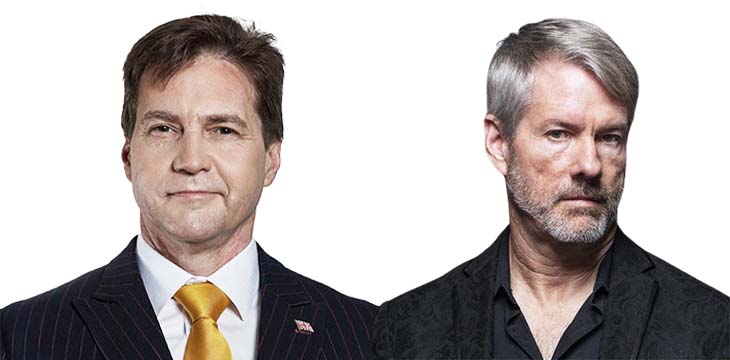BTC proponent Michael Saylor seems unlucky in buying BTC with MicroStrategy. However, to the surprise of many, Saylor recently stated something that Dr. Craig Wright has been preaching for years already.
In a discussion with Not Investment Advice, Saylor said that Bitcoin should not be changed. This is fascinating because usually, BTC maximalists tend to be open to disfiguring the protocol as they please.
Michael Saylor said:
“You can’t keep changing the protocol. That’s the problem. If you change the protocol, then you probably instantiated a security. And now the problem is: if it’s a security, you are trading it illegally on unregistered exchanges without a license to trade a security and you haven’t disclosed all the risk factors of the security. So, it doesn’t work as money.”
Wise words from @saylor that you can’t keep changing the protocol pic.twitter.com/Et78SGgBko
— LIAM (@1liamchai) July 31, 2022
Sounds a lot like that decade-old and famous Satoshi Nakamoto quote concerning the nature of Bitcoin:
The nature of Bitcoin is such that once version 0.1 was released, the core design was set in stone for the rest of its lifetime.
So, now in 2022, Saylor is firm in that Bitcoin shall not be changed. Dr. Craig Wright did mention all of this publicly since at least 2018, though:
- Bitcoin is a commodity (Craig Wright, 2018)
- Set in stone (Craig Wright, 2018)
- Commodity and Security (Craig Wright, 2018)
- Limited change to bring stability (Craig Wright, 2018)
Dr. Wright is way ahead of the curve and always has been. Why is Dr. Wright on point so much? Well, he is Satoshi Nakamoto, the inventor and creator of Bitcoin. The outcome of the Kleiman v Wright court case made this very clear. Further information can be found in the history of how Bitcoin was saved.
Dr. Wright has been consistent in what he publicly stated about Bitcoin, as can be proven by his comments in 2014 up until now in 2022. Dr. Wright does not advocate for changing the Bitcoin protocol and has been very consistent with his own statements concerning Bitcoin being set in stone which makes it decentralized. Consistency, trust—much like the blockchain itself.
Regulatory reasons to not change Bitcoin
Saylor is correct in saying that changing Bitcoin means Bitcoin could be a security. We do not want that, but not for the reasons Saylor stated. He only seems worried about BTC not being able to be traded on unlicensed exchanges anymore due to being a security.
The original Bitcoin—nowadays known as Bitcoin SV (BSV), the BSV blockchain—is not a security. It is an informational commodity.
A commodity is a standardized good. If we acknowledge the bitcoins, the single satoshis themselves are goods that can be utilized for something; we do not have a commodity yet. Only when the single satoshis are standardized could they be a commodity.
Are they standardized? Well, it depends. In BTC, they are not, as BTC has been changed a lot from what Bitcoin originally was and probably will be changed in the future again and again. So there is no standardization in BTC, which means BTC is not a commodity. Saylor’s fear of BTC being perceived as a security is for this reason, whether he knows and understands it or not.
With BSV, though, the Bitcoin white paper is followed. That means the rules set in the Bitcoin white paper are the set in stone foundations. Therefore, the BSV satoshis can indeed be commodities—goods that are standardized, not securities.
Contractual perspective on changing Bitcoin
Saylor only scratches at the surface. He understands that changing Bitcoin means Bitcoin is not Bitcoin anymore. That is what we have seen with BTC. For example: when Segregated Witness (SegWit) was implemented into BTC, it was in breach of the Bitcoin white paper. Therefore, BTC is not Bitcoin anymore since the day Segregated Witness was implemented.
Given the fact that Bitcoin is bound under contract, a change of the protocol has legal implications. Satoshi Nakamoto issued all Bitcoins, and these Bitcoins are now being distributed— from the miners to the exchanges and on to users. In his article “Forking and Passing Off,” the inventor of Bitcoin—Dr. Craig Wright—stated:
Bitcoin has an issuer. In January 2009 (…) I issued 21 million bitcoin, where each individual bitcoin is an indivisible set of 100 million tokens. To distribute the tokens (…), I set up a contractual arrangement where nodes (which many people call miners today) act within a set of common rules that I defined.
Any change in the protocol means a new contractual offer is being formulated. BTC is not the original unilateral contractual offer that Satoshi Nakamoto brought into the world.
If you want to know what BTC is, ask the creators of BTC—the BTC developers, BTC miners, BTC influencers, BTC promoters, BTC dedicated exchanges, and so on. Ask them what kind of unilateral contractual offer they have in store for you. Since they are changing their BTC protocol and are even discussing the removal of the 21 million coin cap on BTC, you will find out there is no solid contractual offer behind BTC.
Fun fact: if you have changed Bitcoin into BTC, you created a new blockchain project and a new coin. Therefore, you are liable and have issued BTC at an extremely high valuation. Think of paying taxes on that issuance. On the contrary, Satoshi Nakamoto issued the original Bitcoin when Bitcoin had no value. But to understand what this means for BTC, watch this video :
Economic reasons to never change Bitcoin
Saylor should also focus on the economic reasons for not changing Bitcoin and not just worry about whether BTC can be traded on unlicensed exchanges. As famous economist George Gilder said in an interview with the Hoover Institution:
It takes a low-entropy carrier to bear high-entropy information. (…) In order to carry (…) a surprising creative signal, you need a predictable carrier.
What you want in economy is predictable laws, predictable political leadership, a spirit of trust which means a contract can be predictable. Property rights, which means that property rights don’t change from time to time. That entrepreneurs can launch their creation through a world that’s governed by predictable rules of law (…).
We want Bitcoin as a predictable carrier to let surprising creative signals occur on it. Therefore, Bitcoin must remain unchanged, or else nobody could predict the future of Bitcoin as the foundation. Without predictability, no building would happen on and with Bitcoin.
George Gilder is a proponent of Bitcoin SV (BSV), by the way, also stated:
Satoshi’s vision is now manifest in a level of transactions that dwarves the level of transactions of BTC. Everybody is focused on market cap of Bitcoin (…), but you get ahead by inventing new things, using money as a measuring stick for your own achievements. And Bitcoin SV is now taking off in the transactional field.
Saylor should take a few hours and listen to everything George Gilder said at various CoinGeek conferences in the past. Gilder literally described Bitcoin SV—the BSV blockchain—as the epitome of the information economy.
If Saylor follows this track, he might find himself agreeing with Dr. Craig Wright more and more in the future.
New to blockchain? Check out CoinGeek’s Blockchain for Beginners section, the ultimate resource guide to learn more about blockchain technology.











